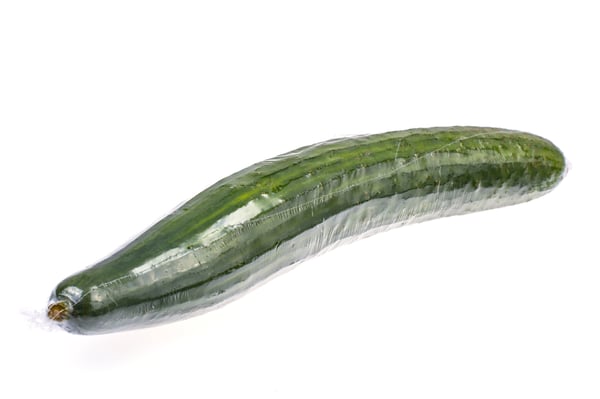Why Shrink Wrap Single Items Of Produce? Pros and Cons.
Packaging Materials | Environment | Packaging Design | Food Packaging
Backup a year and the idea of shrink-wrapping single items of produce such as one orange, apple, or squash may seem laughable. Heading into the end of 2019, the environmental movement was on an absolute tear in pushing companies to abandon single-use plastic, soft plastics, and other plastic items such as shrink films.
Fast forward to today, and all that has changed. With the onset of COVID19, reusable bags, cups, containers, and films are fast being abandoned. In their place, single-use plastic alternatives are being used to help combat the spread of the virus.
Discover the pros and cons of using shrink film to wrap individual pieces of produce as a form of protective packaging in the age of the coronavirus.
Pros Of Shrink Wrapping Single Items Of Produce
There was a time where shrink wrapping every single piece of fruit or vegetables would be looked upon with great disdain. The amount of plastic waste from doing such a thing could be quite sizable. Now that COVID19 has every company in the world working on ways to help stop the spread of the virus, the idea does not seem odd at all.
1. Shrink-wrapping every piece of produce that is sold could very well save lives and tens of thousands of dollars. For example, recently in Pennsylvania, a woman maliciously and intentionally coughed on at least 35,000 dollars worth of produce, meat, deli items, and other products.

The manager of the store lamented the terrible loss of produce that occurred during a time where the supply-chain is already overburdened with keeping up with the demand for these products:
From NBCnews.com:
"I am also absolutely sick to my stomach about the loss of food," Fasula wrote. "While it is always a shame when food is wasted, in these times when so many people are worried about the security of our food supply, it is even more disturbing."
Unfortunately, all the food had to be destroyed and thrown away. And while this act of terrorism (one of the charges brought against her by police) was a genuinely awful loss, it outlines a dire new reality when it comes to food packaging.
Even without problematic members of society doing such things, the spread of COVID19 is still a threat in grocery stores. Even those that take all the proper precautions to prevent the spread of the virus face the danger of it in their stores.
2. Block contaminants from the surface of your products. One critical way that grocery store owners can help to curve the spread of COVID19 further is linked to the unique benefits of polyolefin shrink film.
Need Help Choosing The Right Protective Shrink Film?
Well known as one of the best shrink films to wrap food (as it is FDA approved and kosher), polyolefin films boast the ability to block contaminants like COVID19 from the surface of products. The result is assuring your customers of the safety of the produce wrapped in shrink film.
3. Currently, the produce in most stores is exposed to air. This is a potential problem for even well-meaning grocery shoppers in the current state of things.
By shrink wrapping every single piece of produce in every single grocery store (not to mention other types of food items), we could significantly increase the store's ability to combat COVID19.
By reducing the exposure of products to the virus, polyolefin shrink film can act as an excellent form of protecting packaging resulting in a safer shopping experience for consumers.
4. Another advantage of shrink wrapping is that some products are sold by weight. As produce sits in the grocery store, it can dry out, thus reducing the weight. So, the grocer buys something by weight, and when they sell it, it weighs less. Shrink wrap reduces the amount of weight loss.
Cons Of Shrink Wrapping Single Items Of Produce
Of course, bringing this much shrink film into the supply chain and the marketplace will have some drawbacks. Mainly, the environmental impact could be significant, with far more substantial portions of single-use plastic entering our ecosystem.
1. This would likely result in more plastic items finding their way into our waterways, streams, rivers, and oceans.
2. There are currently multiple ocean clean up projects attempting to resolve major plastic pollution issues like the great pacific garbage patch. However, an influx of these materials could complicate such initiatives.
That being said, few people know that shrink film is 100% recyclable. With this knowledge, perhaps more people would recycle it. Additionally, if recycling companies and municipal recycling operations could make it a point to rework their infrastructure to accept the materials better, we may be able to negate the environmental impact of shrink films and other similar plastic items.
Also, when it comes to plastics and flexible packaging materials like shrink film, despite their significant environmental impact, they are still the most environmentally friendly packaging materials currently available. This is because they have much lower carbon footprints than alternative materials like glass, metal, cardboard, paper, and fabric.
3. Of course, these recycling initiatives would require corporate and individual action to achieve these goals. With the recently extended relaxations of pollution mandated by the EPA, it is unlikely to be a primary focus during these difficult times.
How To Source Food Grade Shrink Film
If you are curious about using shrink film as a boost in your protective packaging needs, you will want to be sure to do your homework. It would help if you considered researching at least 3-4 potential vendors. Next, you should request information, blog posts, video content, white papers, and other informational materials to help you decide on which company has the best shrink film solutions for your needs.
If you are not sure where to begin in this process, we invite you to reach out to one of our packaging experts. With almost 70 years in shrink film and protective packaging solutions, we can help you find the right vendor, even it that vendor is not us.
About Nathan Dube
As the Digital Marketing Specialist at Industrial Packaging, I am honored to create content for such a phenomenal company and work with one of the greatest teams in the Packaging Industry. Whether creating a video, writing blog posts or generating other pieces of content and multimedia, I am always excited to help educate and inspire our prospects and clients to reach their highest potential in regards to their packaging processes and needs.




